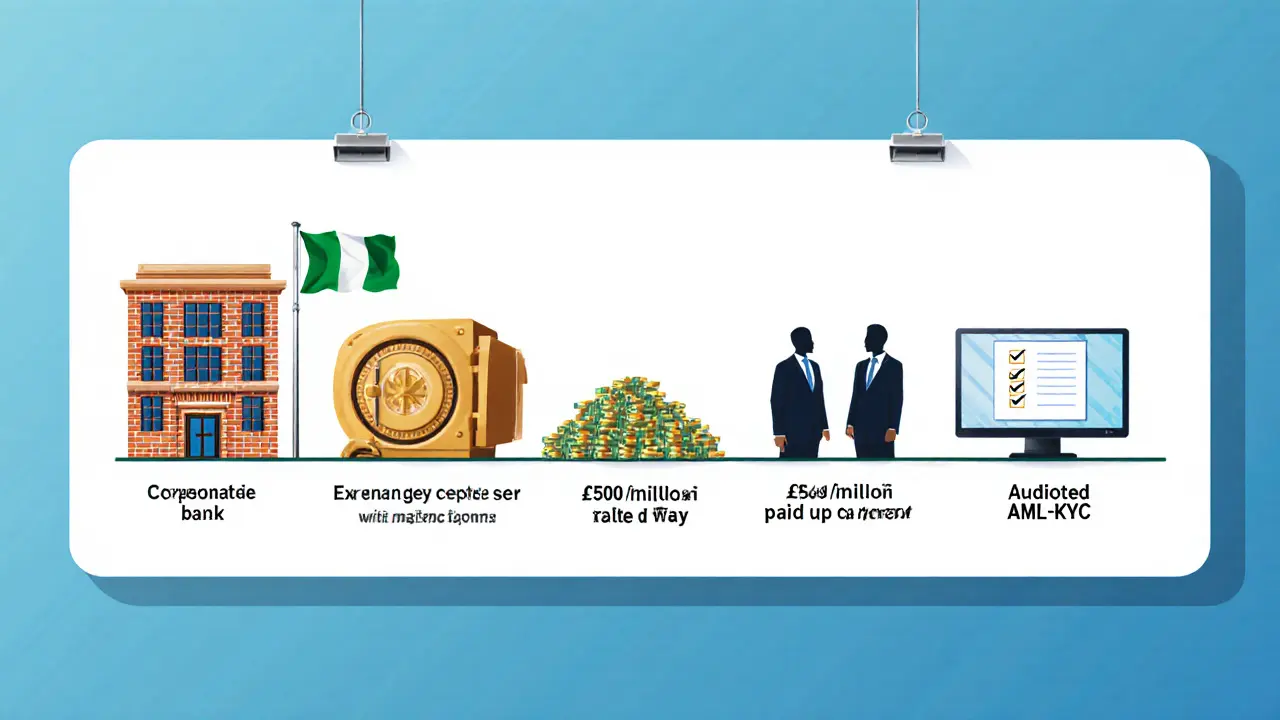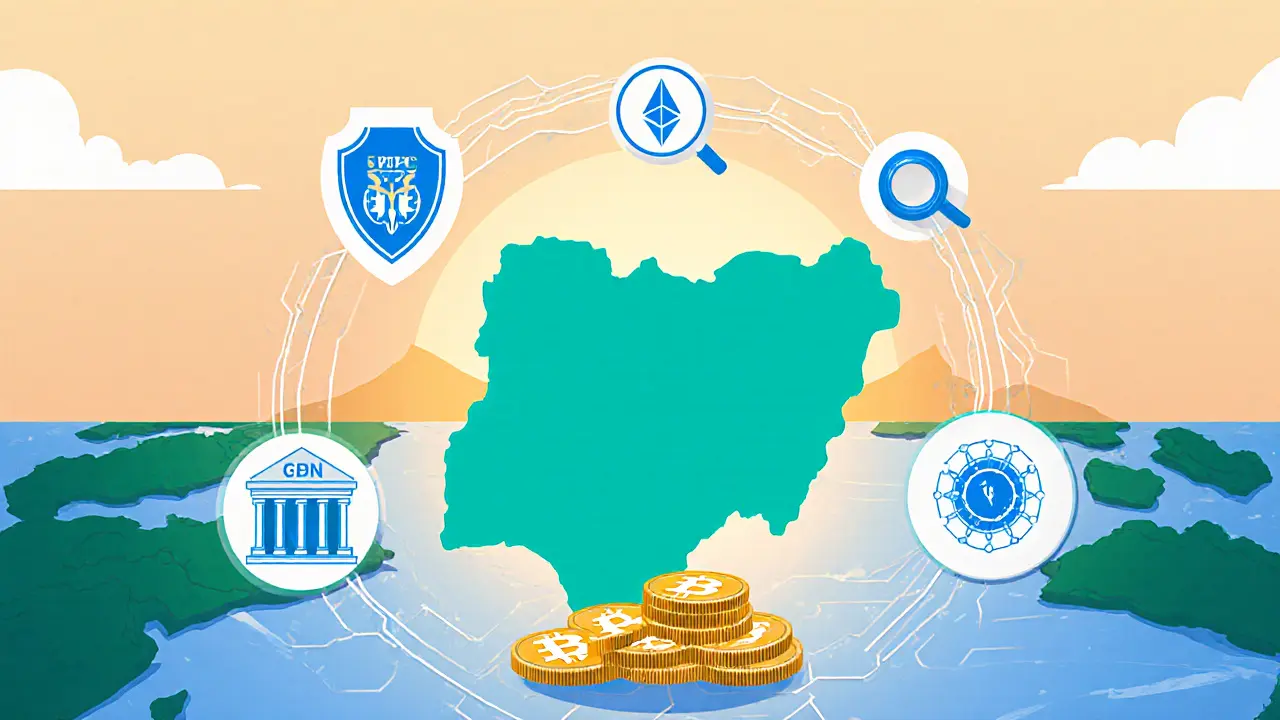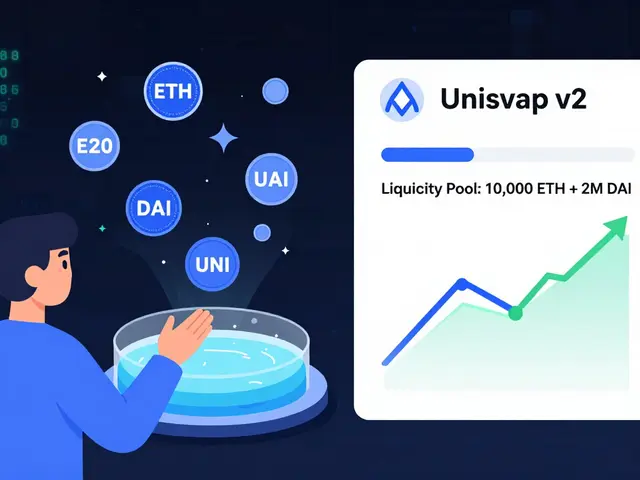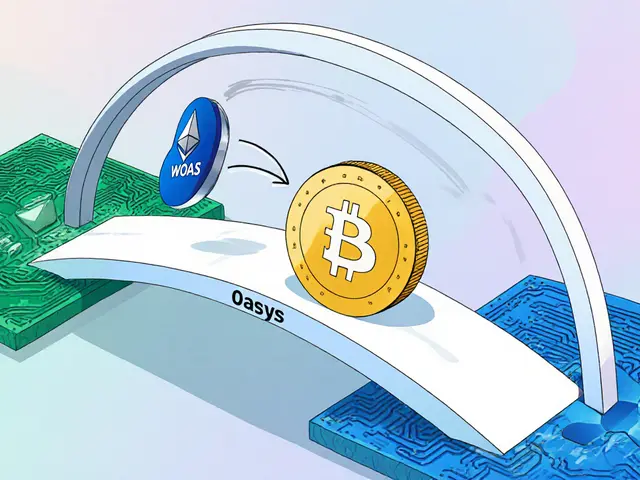Nigeria Crypto Licensing Checker
Check Your Business Type
Select the type of crypto business you're considering to see if it requires a license and what the requirements are.
Your Compliance Summary
When you ask, "Is crypto regulated in Nigeria?" the short answer is yes - but it’s a nuanced picture that has changed dramatically in the last two years. In March 2025 the government passed the Investments and Securities Act 2025 (ISA 2025), officially classifying digital assets as securities and handing oversight to the Securities and Exchange Commission (SEC). At the same time, the Central Bank of Nigeria (CBN) lifted its 2021 ban and issued VASP Guidelines that let banks work with licensed crypto firms. Below you’ll find the practical details you need - whether you’re a trader, a startup, or just curious about the legal climate.
Quick Take
- Crypto is now a recognized security under Nigerian law.
- The SEC issues licenses for exchanges and token issuers; the CBN governs payment‑related services.
- Licensing requires paid‑up capital, a fidelity bond, a local office and Nigerian management.
- Non‑compliant VASPs face fines starting at ₦10million and possible license suspension.
- Tax rules under the Nigeria Tax Administration Act 2025 will take effect in 2026.
How the Legal Landscape Shifted
Before 2025 Nigeria’s approach was contradictory: the CBN banned banks from handling crypto transactions in 2021, yet enforcement was lax, leaving a gray market of peer‑to‑peer trades. The ban hurt users - many had their accounts frozen in 2021 - but it also fueled a massive underground ecosystem. By late 2023 the government realized the economic upside: roughly $92billion worth of crypto moved through Nigerian wallets between July2024 and June2025, making the country one of the world’s largest crypto hubs.
The turning point came with the signing of ISA 2025. The act treats digital tokens as securities, which means the same rules that apply to stocks now apply to crypto assets. The SEC became the primary regulator, working hand‑in‑hand with the CBN, the Economic and Financial Crimes Commission (EFCC), and the Nigerian Financial Intelligence Unit (NFIU) to form a multi‑agency oversight network.
Key Laws and Guidelines
- Investments and Securities Act 2025 (ISA 2025): defines digital assets as securities, sets disclosure standards, and empowers the SEC to grant or revoke licenses.
- CBN VASP Guidelines (Dec2023): allows banks to open accounts for licensed VASPs, outlines AML/KYC expectations for payment services.
- National Anti‑Money Laundering Act (Amended 2025): extends AML obligations to virtual assets, giving regulators access to telecom data for fraud investigations.
- Nigeria Tax Administration Act 2025 (NTAA): introduces a 10% capital gains tax on crypto profits, effective 2026, with penalties for under‑reporting.
Licensing Requirements for Crypto Businesses
Anyone wanting to run an exchange, a token sale platform, or a crypto‑focused fintech must apply for a license from the SEC. The process is split into two main categories:
- Provisional License - Allows a pilot operation for up to 12months while the regulator reviews full compliance.
- Full License - Granted after the provisional period, provided all technical and financial criteria are met.
Both categories share core obligations:
- Paid‑up capital of at least ₦500million (≈$3,300) for exchanges; ₦250million for token issuers.
- Fidelity bond covering 150% of the paid‑up capital.
- Registered Nigerian corporate entity with a physical office and at least two Nigerian directors.
- Robust AML/KYC program audited by an SEC‑approved third party.
- Monthly reporting to the SEC and quarterly reports to the NFIU.
The first provisional licenses were awarded in late2024 to Busha and Quidax. Dozens of applications are now in the pipeline, but the vetting process can take six months or longer.
| License Type | Capital Minimum | Bond Requirement | Typical Duration |
|---|---|---|---|
| Provisional | ₦500M (exchange) / ₦250M (token) | 150% of capital | Up to 12months |
| Full | ₦1B (exchange) / ₦500M (token) | 150% of capital | Indefinite, subject to renewal |

What It Means for Crypto Users
For everyday traders, the new rules bring both clarity and new responsibilities. Here’s the practical impact:
- Legal Safety: Trading on a SEC‑licensed exchange shields you from the risk of account freezes that plagued users in 2021.
- KYC Checks: You’ll need to verify your identity with a government ID, proof of address, and possibly a source‑of‑funds statement.
- Tax Reporting: Starting 2026 you must declare crypto gains on your annual tax return. A 10% capital‑gains tax applies, with penalties for late filing.
- Peer‑to‑Peer (P2P) Trading: P2P remains legal, but platforms facilitating large‑scale P2P without a license could be targeted for enforcement.
Most Nigerians continue to favor P2P because it’s fast and cheap, but the trend is shifting toward licensed exchanges as they improve user experience and offer fiat on‑ramps.
Compliance Challenges for Businesses
The regulatory environment is thorough, which is great for consumer protection but can be a headache for startups:
- Overlapping Jurisdictions: The SEC governs securities‑type activities, while the CBN controls payment‑related services. Companies that do both need to file with two regulators.
- Documentation Load: Monthly transaction reports, AML logs, and quarterly risk assessments consume significant resources.
- Local Talent Requirement: You must appoint at least one Nigerian senior manager who can be reached by the SEC for compliance queries.
- License Delays: The SEC’s thorough vetting means even well‑prepared firms can wait six‑plus months before a provisional license is issued.
Most firms outsource compliance to local law firms that specialize in the ISA 2025 framework. That adds cost but reduces the risk of costly penalties - which start at ₦10million for the first month of non‑compliance and increase by ₦1million each additional month.
Future Outlook and Regional Context
Compared with Kenya and South Africa, Nigeria was the first in Africa to create a full licensing regime for crypto. The multi‑agency model offers robust consumer protection, yet it also adds complexity. Analysts expect the following trends:
- More Licenses: As the SEC refines its Digital Assets Rules, we’ll see a steady stream of new license approvals, especially for niche services like crypto‑backed loans.
- Tax Integration: Once the NTAA kicks in, tax software providers will add crypto modules, making compliance smoother for users.
- Regional Collaboration: Nigeria is part of a pan‑African fintech coalition that aims to harmonize crypto regulations, reducing cross‑border friction.
- Innovation Hubs: Cities such as Lagos and Abuja will attract crypto‑focused incubators, leveraging the clear legal framework to pull foreign investment.
In short, the regulatory certainty is turning Nigeria into a fintech hotspot while still protecting its massive, un‑banked population.
Getting Started - A Checklist for Entrepreneurs
- Incorporate a Nigerian private limited company and set up a physical office.
- Appoint at least two Nigerian directors, one of whom will serve as the compliance officer.
- Secure the required paid‑up capital and obtain a fidelity bond from an approved insurer.
- Develop an AML/KYC program that meets SEC and NFIU standards; have it audited by a certified third party.
- Submit the provisional license application through the SEC’s online portal, attaching corporate documents, capital proof, and bond certificates.
- While waiting, engage a local legal counsel experienced in ISA2025 to review contracts and token sale structures.
- Plan for ongoing reporting: monthly transaction summaries to the SEC and quarterly AML reports to the NFIU.
Following these steps minimizes the chance of hitting a regulatory roadblock later on.
Frequently Asked Questions
Is it illegal to own Bitcoin in Nigeria?
No. Owning Bitcoin or any other cryptocurrency is legal. The restriction that existed before 2025 only applied to financial institutions facilitating crypto transactions, not to private individuals.
Do I need a license to run a peer‑to‑peer trading platform?
If the platform merely connects users and does not hold or custody crypto, it can operate without a license, but the SEC expects the service to register as a facilitation service and comply with basic AML/KYC standards.
What happens if a crypto exchange ignores the new regulations?
The SEC can levy a ₦10million fine for the first month of non‑compliance, add ₦1million for each subsequent month, and ultimately suspend or revoke the exchange’s license.
How will crypto taxes be calculated under the NTAA?
A flat 10% capital gains tax applies to net profits from crypto disposals. Losses can be offset against gains, and the tax return must be filed with the Federal Inland Revenue Service by the usual deadline.
Are NFTs considered securities in Nigeria?
Only NFTs that are marketed as investment products or that generate income streams fall under the securities definition. Purely artistic NFTs remain outside the SEC’s jurisdiction.



 Finance
Finance





Lara Cocchetti
February 10, 2025 AT 23:36While the official narrative paints a picture of regulatory clarity, one must wonder who really benefits from this sudden embrace of crypto. The timing aligns suspiciously with a wave of offshore funding slipping through the cracks, and the ordinary Nigerian trader is left to shoulder the burden. It feels as if a hidden elite is dictating the rules while claiming consumer protection. In the end, transparency remains a distant dream.
Linda Welch
February 18, 2025 AT 23:36Oh great, another "clear" regime that will magically fix everything. The SEC and CBN joining forces sounds like a romance novel written by bureaucrats with no clue. Suddenly all the sand in the desert of crypto will turn into gold because a license costs half a billion naira. The people who actually trade are supposed to smile and trust the process. It's almost comical how the government pretends this will stop the underground market. Yet we all know the real power lies elsewhere.
meredith farmer
February 26, 2025 AT 23:36Honestly, the drama surrounding Nigeria's crypto laws could rival any TV soap. Every new clause feels like a twist that keeps us on our toes, waiting for the next shock. The SEC's sudden authority makes me question what other secrets they're hiding behind those velvet doors. Yet, I stand firm: if we keep playing the victim, they'll never hear our real concerns. It's time to demand genuine transparency, not just more paperwork.
Krithika Natarajan
March 6, 2025 AT 23:36Thank you for sharing this detailed overview; it really helps clarify the landscape.
Ayaz Mudarris
March 14, 2025 AT 23:36The incorporation of the Investments and Securities Act 2025 marks a pivotal shift toward regulatory robustness. It is imperative that emerging firms allocate resources to build comprehensive AML/KYC frameworks, lest they face punitive measures. Moreover, aligning compliance strategies with both SEC and CBN mandates will streamline operational workflows. Prospective entrepreneurs should heed these guidelines to ensure sustainable growth.
Irene Tien MD MSc
March 22, 2025 AT 23:36When you peel back the glossy press releases, you see a labyrinthine web of control that stretches far beyond the superficial veneer of "consumer protection". The ISA 2025, while framed as a beacon of modernisation, cleverly reclassifies digital assets as securities, effectively handing them over to a regulatory body that has historically been more comfortable with equities than with cryptographic innovation. This maneuver grants the SEC unprecedented sway over market dynamics, allowing it to dictate who can operate, where, and under what conditions, all under the guise of mitigating money‑laundering risks.
But consider the timing: just months after the global crypto market suffered a series of high‑profile collapses, the Nigerian government swiftly moves to lock down the industry, urging compliance through capital requirements that would cripple most independent operators. A paid‑up capital of ₦500 million translates to roughly three thousand dollars for a fledgling startup-an amount that, while not insurmountable for multinational firms, is a prohibitive barrier for local innovators. This effectively filters out grassroots projects, concentrating power in the hands of those with deep pockets and existing financial infrastructure.
Simultaneously, the CBN's VASP Guidelines appear to offer a lifeline, permitting banks to engage with licensed entities. Yet, this permission is contingent upon strict adherence to AML protocols that are, in practice, a labyrinth of paperwork, third‑party audits, and continuous reporting. The net result is an ecosystem where only entities that can afford layers of legal counsel and compliance officers will survive, pushing the remainder into the shadows where enforcement is both difficult and, paradoxically, less transparent.
Those of us attuned to the subtle currents of power understand that these regulations are less about protecting the average citizen and more about funneling economic activity into channels the state can monitor and, ultimately, tax. The forthcoming 10 % capital‑gains tax, set to take effect in 2026, will further underscore this narrative: the state is preparing to reap the financial rewards of an industry it once tried to suppress. In short, while the headline reads "regulation for safety", the subtext whispers "control and revenue extraction". The question remains-will ordinary Nigerians reap any benefits, or will they simply become another footnote in a regulatory playbook designed by and for the elite?
Kevin Fellows
March 31, 2025 AT 00:36That was an eye‑opener, thanks for breaking it down. Stay hopeful – good practices can still thrive.
Alie Thompson
April 8, 2025 AT 00:36It is morally incumbent upon us to examine the ethical ramifications of such sweeping regulatory reforms. By imposing steep capital thresholds, the state effectively marginalizes the underprivileged, perpetuating socioeconomic disparity. Moreover, the heavy fines for non‑compliance signal a punitive rather than protective stance, which is antithetical to the principles of justice. We must demand that regulators balance market integrity with equitable access, lest we betray the very citizens they claim to protect. Transparency should not be a buzzword but a lived reality for every trader, regardless of scale. The onus falls on the community to hold policymakers accountable, ensuring that the rules serve the many, not the few.
Samuel Wilson
April 16, 2025 AT 00:36Well articulated, and a reminder that perseverance coupled with strategic compliance can pave the way forward. By aligning your operational model with the outlined requirements, you not only mitigate risk but also position yourself as a trustworthy market participant. Keep up the diligent work, and the regulatory landscape will become less of an obstacle and more of a framework for sustainable growth.
Rae Harris
April 24, 2025 AT 00:36Honestly, the whole licensing saga is just an industry‑centric echo chamber. The jargon about "AML/KYC" masks the reality that most users just want fast, cheap transfers. It's a classic case of regulators chasing shiny objects while missing the real pain points.
Danny Locher
May 2, 2025 AT 00:36That’s a solid point; sometimes the simplest solution is the best one. Keeping an eye on user experience can help us cut through the hype and focus on what truly matters.
Emily Pelton
May 10, 2025 AT 00:36Listen, everyone-this is NOT just "some paperwork"; it's a monumental shift, and it demands our full attention!; the SEC’s new mandate, coupled with the CBN’s guidelines, creates a double‑edged sword, and we must navigate it carefully, because-if we don’t-our projects could be derailed, instantly; remember, compliance isn’t optional, it’s the lifeline of any serious venture, and ignoring it would be reckless, plain and simple.
sandi khardani
May 18, 2025 AT 00:36Honestly, the entire regulatory charade reads like a textbook example of bureaucratic overreach, designed to stifle innovation under the pretense of protection. By inflating capital requirements and layering endless reporting obligations, the state creates a fortress that only well‑funded conglomerates can breach, leaving genuine entrepreneurs to wither. The punitive fines, which start at ₦10 million, are not deterrents but rather financial weapons wielded against any dissenting entity that dares to operate outside the sanctioned corridors. This is not about safeguarding the public; it’s a calculated move to centralise economic power. The market will inevitably respond by pushing activity into the shadows, where oversight is both impossible and, paradoxically, more dangerous for everyday users. We must see through this smokescreen and advocate for a balanced framework that truly serves the broader community.